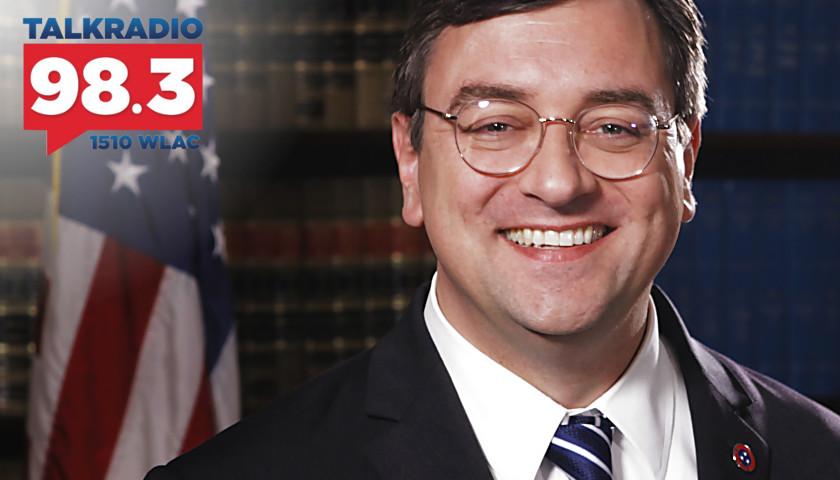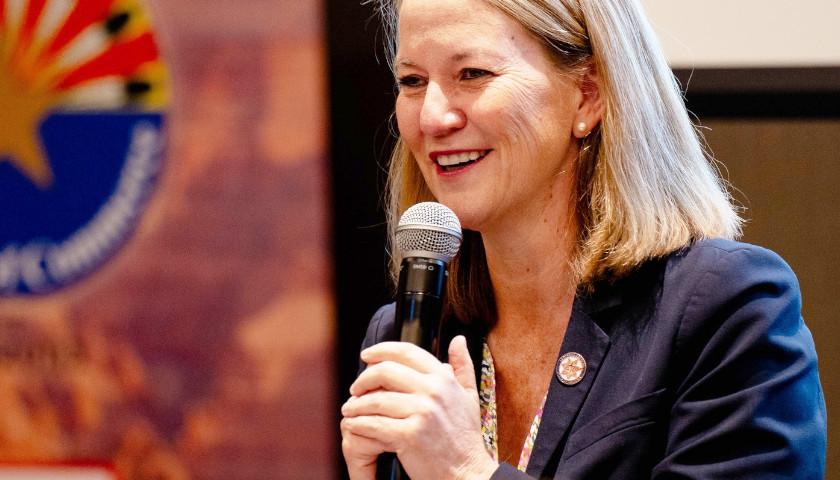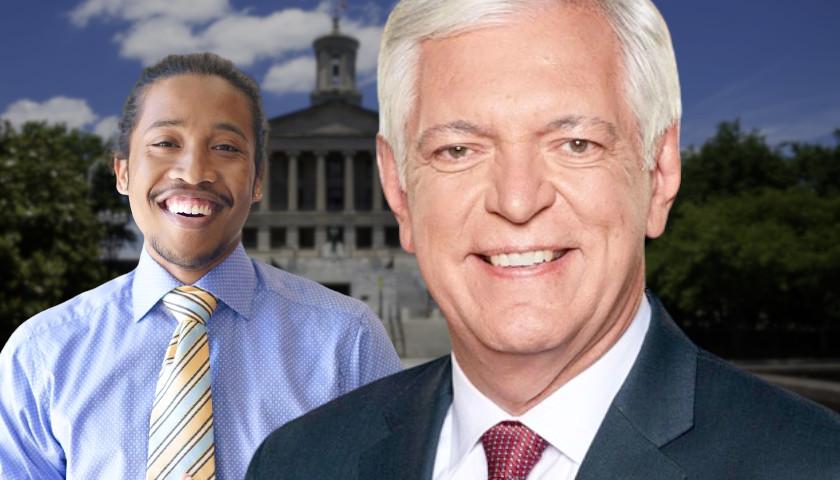Tennessee Attorney General Jonathon Skrmetti joined The Tennessee Star Report with Michael Patrick Leahy on the newsmaker line Monday to discuss the nation’s first-ever decision by the Court to uphold a prohibition on medical procedures performed on minors.
TRANSCRIPT
Michael Patrick Leahy: 7:06 AM. Original all star panelist Crom Carmichael is in studio; on the newsmaker line, right now, our very good friend, Tennessee Attorney General Jonathan Skrmetti.
General Skrmetti, congratulations on your legal victory.
The prohibition on medical procedures performed on minors related to the Sexual Identity Act which was originally scheduled to go into effect July the first because of your legal victory in the sixth circuit.
Is now in effect. Tell us about that, General Skrmetti.
Jonathon Skrmetti: Sure.
So this is the first time a federal court has ever ruled that one of these prohibitions can go into effect. There was a string of losses in the Arkansas, the Alabama, the Florida in the Indiana cases. Several of those are up on appeal now. But this is the first time a court has said that a state is able to regulate this.
And what it means is, kids aren’t able to get put on these irreversible treatments you know, with puberty blockers, with hormones, with surgery because they’re minors. And, you know, there was a lot of concern in the general assembly that these are kids who can’t consent to these life altering decisions.
Now we’re able to protect them from doing that.
Michael Patrick Leahy: Well, congratulations.
What, what in your argument do you think made the difference with the Sixth Circuit in this particular instance?
Jonathon Skrmetti: So there were two major issues. The first was the scope of the injunction, and this is just a broader issue involving a lot of our litigation.
For a while the district courts were enjoining states when just a few people would sue, and even the dissent in the Sixth Circuit opinion here said ‘no.’
The appropriate scope in an injunction like this is just the parties to the lawsuit, but the more important issue is the constitutional issue. And there’s been this idea that the equal protection clause means that you are not able to do anything to regulate the treatment of transgender kids.
And the Sixth Circuit looked at that, took a hard look at what the 14th Amendment actually means, and whether there was a substantive due process interest here – whether there was an equal protection interest.
And they said, ‘no.’ The Constitution doesn’t mean that there is room. Within our constitutional structure for the legislatures to regulate the healthcare industry.
And this is a situation where the legislature is making the call that this is more dangerous than it is helpful. Which echoes what we’ve seen coming out of Europe – from a number of European countries – that have looked at the evidence here. And the legislature has the authority to protect our kids.
Michael Patrick Leahy: Now, the case in question here is called LDLW v Clemetti. That is still going to be heard in federal district court. Is that correct?
Jonathon Skrmetti: That’s correct. So this was just litigating over the injunction. The court had seen the lawsuit come in. The plaintiffs asked the court to stop the state from being able to enforce this law.
The court granted that motion. We did an emergency motion up to the sixth circuit saying we need to be able to enforce this law. And what the sixth circuit did was stay the injunction. It’s very preliminary. There’s a lot of litigation left here, but in the meantime, we are able to enforce the law and this is the first time that’s ever happened.
Michael Patrick Leahy: And the sixth Circuit said that the state of Tennessee is likely to win the constitutional argument in the case.
Do you anticipate, General Skrmetti, that they will – that the plaintiffs in this case will – appeal the emergency motion for a stay to the United States Supreme Court?
Jonathon Skrmetti: You know, I don’t wanna, I don’t wanna speak for them. We’ve obviously come at this from very different directions, but there are a couple reasons I think they might not. The first is that there’s a grace period for people who are already getting treatments. So the legislature knew that this was gonna be an issue with the courts and built in I think it goes until the end of March of next year, a period where people who are still receiving treatment can continue to receive that treatment.
And so there’s no immediate urgency for people who are getting the treatment. And the other reason is, you know, I think we’ve got some momentum now. That’s never happened in one of these cases. You know, they may not wanna roll the dice on that. On the other hand, they might – and if they do, we’re very happy to litigate it on up there.
We’ll just see what happens.
Michael Patrick Leahy: How would the mechanics of this work? In other words, the Supreme Court is not in session now. If they were to appeal the stay of the preliminary injunction, what’s the process by which that would go to the Supreme Court and when would the Supreme Court rule on that?
Jonathon Skrmetti: So it would go up as an emergency motion, which is another reason it probably wouldn’t get heard.
The court is just winding up a pretty intense stretch. And I think, you know, they’re probably not inclined. And again, I can’t speak for them, but this is just my guess: They’re probably not inclined to jump immediately into this really contentious issue.
You know, there’s a fuller hearing, so this was just a stay on the injunction. The appeal on the injunction is gonna be heard and sold by the end of September, which means if anybody tried to take this to the Supreme Court, the court might say, let’s give the court below more time to consider it.
You know, Chief Judge Sutton mentioned that he wrote this thing in a week. And it may be that there’s a need for more reflection on it. Now, I think, you know, the arguments that he makes in the opinion, recognizing that this is not a constitutional issue echo what we’ve been thinking for a while.
So I fervently hope that he doesn’t change his mind about it. But, you know, it was a pretty quick decision on an emergency motion, and usually the court – the Supreme Court – likes things to percolate a little bit more.
Michael Patrick Leahy: Yeah. Now, General Skrmetti, you’ve been in office now for almost a year. It’s been a pretty fast year.
Do you have any reflections on your first year as Attorney General for the state of Tennessee?
Jonathon Skrmetti: It has been so much busier than I expected.
I mean, I didn’t take this job to be bored. I’m not upset that we’ve had a lot going on – but we have had a lot going on.
You know, I knew there would be some constitutional stuff, I knew we’d be defending some statutes – that’s been much more intense than I expected. You know, we’ve been pushing back all over the place against the administrative state and that’s been really busy. And then consumer protection, which is something I care a lot about – I worked a lot on in the past.
It’s been very busy. You know, we’re, we’re doing some significant investigation of the tech industry and there are some other really big cases out there. Opioids is still being wrapped up, too, a lot of cases there bringing good money to the state to fight that.
So it’s been a busy year – the word of the year is definitely “busy” and I hope I can sustain this pace for another seven.
Because, whew!
Michael Patrick Leahy: I have confidence you can. And if you need, you know, if you need a little encouragement, you can always come here in studio and we’ll have a nice, friendly conversation to encourage you in your, your great look.
I will just say this on behalf of all of our listeners and on behalf of the people of Tennessee.
I wanna say thank you for doing a great – I mean, not good job, a great job defending Tennessee’s rights in federal court.
Every time I see a story, I say, well, this is troublesome, but I know General Skrmetti and his team are on it.
Jonathon Skrmetti: Well, I appreciate that vote of confidence. We’re here to give the best representation we can to the state of Tennessee, and I’ve got a great team.
The, the team on this case, the LW case, just did a fantastic job. They were under such time pressure, they worked so hard and, you know, I’m really proud of them and we’re just, you know, trying to continue to build up the ability in the office to really litigate these cases. We’re getting some hard stuff, some complicated stuff, some very controversial stuff.
And to fight those fights. We need a good team, and I’m happy to say that we’ve got one.
Michael Patrick Leahy: Last question for you. And I am amazed at just the, the huge number of cases that you have to be involved in to defend the right of Tennesseans. Do you have enough attorneys to work with you and would it be a good idea for the Tennessee General Assembly when they meet back in January to significantly increase your budget for attorneys?
Jonathon Skrmetti: Well, they were very generous last session, so I don’t want, I don’t want to ask for too big an increase, but we are looking at the numbers. You know, we’re in a world where people just litigate everything. It’s a different world than we used to be in, and our folks are stretched pretty thin.
We’ve had to bring in outside counsel to help, especially with some folks retiring, you know, to fill those gaps. When we get the internal capacity up to speed, I think I probably will be asking for a little bit more help in a couple specific areas. But I’m looking at the numbers and trying to make sure we’ve got a really good justification before we do that.
Great.
Michael Patrick Leahy: Great. Well, Attorney General Jonathan Skrmetti, thanks so much for joining us today and keep up the great work for the state of Tennessee.
Jonathon Skrmetti: Thank you.
Michael Patrick Leahy: We’ll be back with more after this
– – –
Tune in weekdays from 5:00 – 8:00 a.m. to The Tennessee Star Report with Michael Patrick Leahy on Talk Radio 98.3 FM WLAC 1510. Listen online at iHeart Radio.




